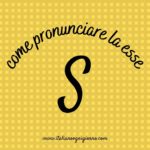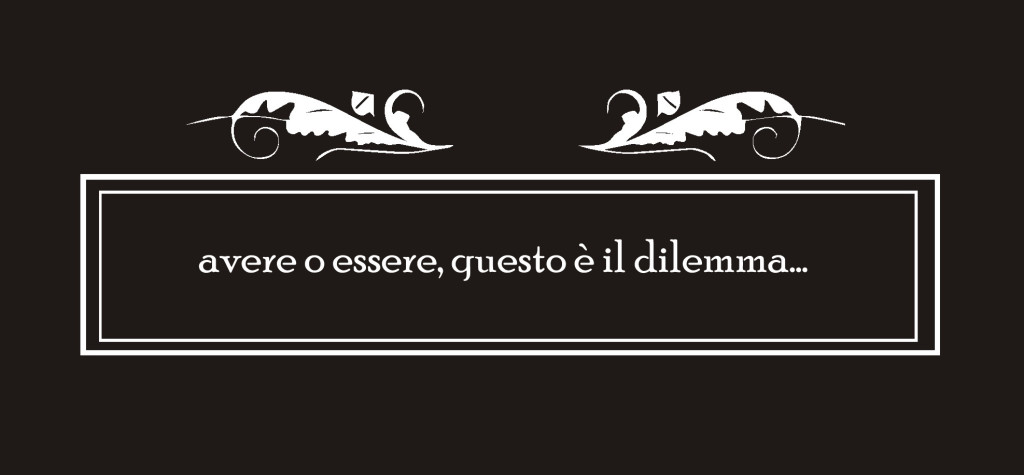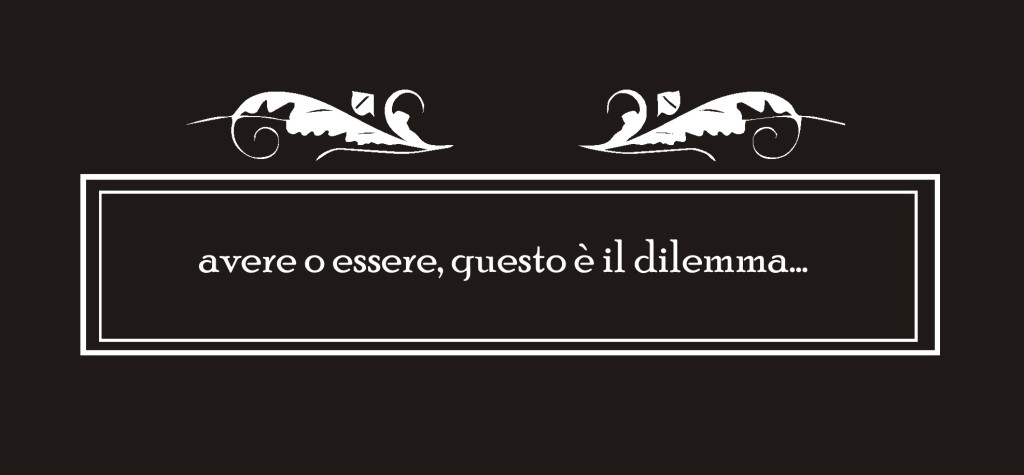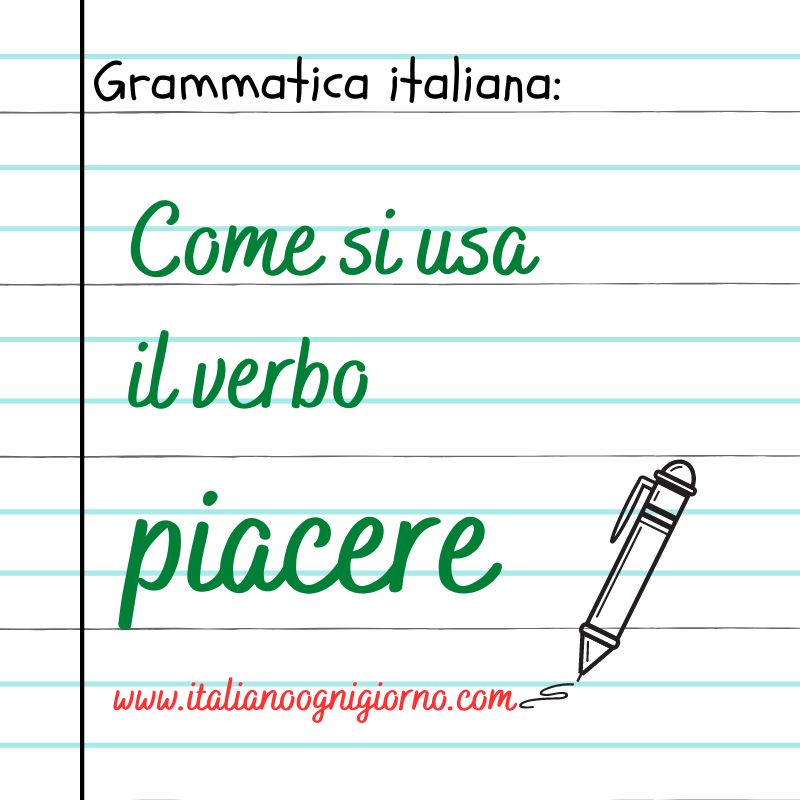Tag: verbs
How to use idiomatic expressions formed by “avere” and “essere”
by Mirella Colalillo on May 3, 2014
It’s well-known by now, “è risaputo ormai”, that Italians are the leaders not only in delicious food, fashion, cultural treasures, but also in expressing feelings, sensations, and opinions. From happiness to dissatisfaction and everything in between.
If you run into your Italian friend and ask her how she is doing, forget about “I’m good, and you?” for an answer, and instead, prepare for a detailed description of “vita, morte e miracoli”, as we say in Italian. If you don’t want to be labeled as “antipatico/a”, I suggest you follow along and do the same. At worst, “male che vada”, you might end up enjoying yourself “al bar”, at the coffee shop. And let’s be honest, going for your daily jog in the park and rushing to update your Facebook, Twitter, “e chi più ne ha più ne metta”, and so on and so forth status can wait anyway.
“Ascoltare. Non c’è cosa migliore da fare che ascoltare chi ha qualcosa da dire” @parlate_it
(Tweet-worthy!)
(Translation: “To listen. There is nothing better to do than to listen to someone who has something to say.”)
The best way to make a good impression, “fare una bella figura”, is to learn the most common idiomatic expressions in Italian that use “avere” (to have) and “essere” (to be), which, as many of you have complained “all’italiana” (Italian style), do not correspond to the English expressions. For example: “Io ho sonno” (I’m sleepy), “Io sono stanco” (I’m tired).
Avere + noun is used in many idiomatic expressions in Italian, but the equivalent English expressions are generally formed with essere + adjective.
There is no specific rule that explains this difference. The best advice is to:
- first learn the conjugations of the verbs “essere” and “avere” starting with il “presente indicativo”
- then learn each expression correctly
- and as always practica, pratica, pratica!!
Here are some idiomatic expressions in Italian that use “avere” and “essere”.
“Avere” is used in the following expressions:
avere caldo – to be hot
avere freddo – to be cold
avere fretta – to be in a hurry
avere paura – to be afraid
avere bisogno di – to need
avere voglia di – to want, to feel like
avere a che fare con – to deal with
avere sete – to be thirsty
avere sonno – to be sleepy
avere fame – to be hungry
“Essere” is used in the following expressions (just like in English!):
essere stanco/a – to be tired
essere arrabbiato/a – to be angry
essere contento/a – to be happy
essere annoiato/a – to be bored
essere felice (m/f) – to be happy
essere triste (m/f) – to be sad
essere entusiasta (m/f) – to be enthusiastic
essere preoccupato/a – to be worried
essere in ritardo – to be late
essere testardo/a – to be stubborn
Allora, come sto?
Oggi sono felice e ho voglia di fare una passeggiata. Non ho freddo, perché è finalmente arrivata la primavera in Canada! Sono molto entusiasta!
(How am I? Today I am happy and I feel like taking a walk. I’m not cold, because spring has finally arrived in Canada! I’m enthusiastic!)
E tu come stai? Let me know in the comments below.
Remember there is no quick fix in learning idiomatic expressions… practice makes perfect!
If you liked this post please share & like!
Grazie,
Mirella
Popular posts:
How to use the verbs piacere and mancare in Italian
Come si usano i verbi piacere e mancare?
English follows
Allora, come si usa il verbo piacere? E’ una domanda che ricevo spesso. Credo che sia una buona idea rivedere come usare il verbo “piacere”, e verbi simili come “mancare” “servire”, “interessare”, ecc.
Per esempio, in italiano “mancare” può essere usato in diversi modi con vari significati. Vedremo il caso in cui significa “desiderare” indicando impazienza per qualcosa.
In questo caso segue una costruzione particolare che è comune anche ad altri verbi come “piacere” (vedi l’elenco sotto): ciò che ci piace è il soggetto mentre la persona che esprime apprezzamento diventa un pronome indiretto.
Mi (pronome indiretto) manca (verbo) l’Italia (soggetto).
Mi manca l’Italia.
È importante prendersi un momento per ripassare i pronomi indiretti e ricordare dove sono inseriti in una frase. Vedi la scheda in basso. Esistono 2 forme di pronomi indiretti: forma atona e forma tonica. La forma tonica è solitamente usata per enfatizzare.
So, how is the verb “piacere” used? It’s a question I get often. I think it’s a good idea to review how to use the verb “piacere”, and similar verbs like “mancare”, “servire”, “interessare”, etc.
In Italian “mancare” can be used in several ways with various meanings. We’ll learn how to use it when it means “to miss/to long for”, indicating impatience for something.
In this case it follows a particular construction that is also common to other verbs such as “piacere” (see list below): what we like is the subject while the person who expresses appreciation is expressed with an indirect object pronoun.
Mi (indirect object pronoun) manca (verb) l’Italia (subject).
I miss Italy.
It’s important to take a moment to review the indirect object pronouns and to remember where they are placed in a sentence. See the chart below. There are 2 forms of indirect object pronouns: forma atona and forma tonica. The forma tonica is usually used for emphasis.
| SINGULAR forma atona | SINGULAR forma tonica |
| before the verb | before/after the verb |
| mi (to/for) me | a me (to/for) me |
| ti (to/for) you | a te (to/for) you |
| gli (to/for) him | a lui (to/for) him |
| Le/le (to/for) you (formal m. and f.) | a Lei/a lei (to/for) you (formal m. and f.) |
| PLURAL forma atona | PLURAL forma tonica |
| before the verb | before/after the verb |
| ci (to/for) us | a noi (to/for) us |
| vi (to/for) you | a voi (to/for) you |
| gli (to/for) them | a loro (to/for) them |
Ricorda:
– Il verbo essere è l’ausiliare al passato prossimo: “Mi sono mancati i miei amici”. oppure “I miei amici sono mancati a me”.
– Il verbo mancare è singolare se seguito da un infinito: “Mi manca mangiare gli spaghetti”.
– A seconda della forma di pronome indiretto che stai utilizzando, la posizione dell’oggetto e del soggetto può essere invertita: “Mi manca l’Italia” o “L’Italia manca a me”.
Remember:
– The verb essere is used as the auxiliary in the passato prossimo tense: “Mi sono mancati i miei amici.” or “I miei amici sono mancati a me”.
– The verb mancare is singular when followed by an infinitive: “Mi manca mangiare gli spaghetti”.
– Depending on which form of indirect pronoun you are using, the position of the object and the subject can be inverted: “Mi manca l’Italia” or “L’Italia manca a me.”
Un elenco di altri verbi che seguono la stessa regola:
A list of other verbs that follow the same rule:
piacere – to like, to be pleasing
bastare – to be sufficient
attrarre – to attract
occorrere – to need
succedere – to happen
restare – to remain
servire – to serve
interessare – to interest
disgustare – to disgust
parere – to appear
sembrare – to seem
volerci – to take
Ecco un esercizio per fare fare pratica e non diemnticare di scrivere delle frasi nei commenti!
Here’s an exercise to help you practice and don’t forget to write some sentences in the comments!
📝 ESERCIZIO: COME USARE MANCARE (clicca qui) 📝
- Il Discorso diretto e discorso indiretto in italiano

- I massacri delle foibe – Il Giorno del Ricordo

- Un racconto di Natale: Il Tesoro dei Poveri di Gabriele D’Annunzio

- Estate di San Martino- leggenda e tradizioni

- I verbi fraseologici: venire/andare a prendere

- Michela Murgia: tenace scrittrice e attivista italiana

- I Vini italiani |Storia e Cultura

- Come diventare migliori comunicatori in italiano

- 3 ways to pronounce the s in Italian




